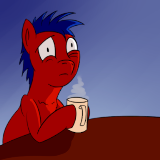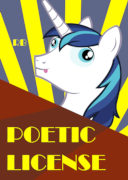Showing the Monster · 2:20pm Nov 14th, 2018
Showing the Monster
Two common pieces of advice for writing horror, and why they miss the mark.
I've wanted to write this one for a while, but a recent discussion in #writing-help (yes, that #writing-help) got me thinking about it again.
Horror is a very complicated genre. In fact, I think it is one of the hardest genres to pull off successfully, especially in prose (I'll let my own failures be a testament to this). It requires careful attention to detail, pinpoint pacing, and careful theming to get inside the heads of your readers and make them think twice before they turn the lights out at night. This is one of the reasons I love the genre when done well.
However, it is also filled with pitfalls and traps for anyone who may not quite have a grasp on what they're doing yet, which is why so many works of horror (in all media) are unfortunate, gore-spattered, cliche-ridden messes. A quick browse through the horror section of this very website is enough to showcase this in full force.
Horror is not an easy genre to get right, especially on your first go-around.
Why, then, do we keep giving the same shallow, thoughtless, highly-situational advice whenever someone asks for help with it?
Time and time again, both in the cesspools of #writing-help and the cleaner waters beyond it, I have seen the same question asked, and the same advice given. It goes something like this:
"Hi, I'm interested in writing horror. Does anyone have any tips—"
"Don't show the monster!"
"Horror needs rules!"
"Something something fear of the unknown!"
And to be fair, that last one is good, great even! But the first two are...
Well, they aren't wrong.
But they aren't right, either.
Let's take a closer look at these, starting with...
Don't Show the Monster!
Ignoring for the moment that this advice is only applicable to stories which have a monster to hide, it is also very surface-level, and it's not always useful. There are many successful works of horror that do show the monster, (some even in their very first scene, such as A Nightmare on Elm Street, or IT). But there are some very good ideas behind this piece of advice.
The first is that the reader's mind is a powerful thing. It can conjure up ideas and images far more terrifying than anything you can put to paper. (This is actually something that is good to remember for all writing.) But the source of fear isn't always the monster itself or its appearance, and in these cases hiding it does little. And even then, simply using less, more evocative description can go a long way.
The second is the fear of the unknown, and this is the far more interesting one.
There is little in the horror genre that doesn't take advantage of the fear of the unknown. It is one of the most universal, and most versatile, sources of fear that can be drawn upon. Entire subgenres have sprung up around this single concept.
And this is where not showing the monster really shines. Hinting at a threat's existence and foreshadowing at its true nature to create fear and dread is a staple of the genre, and for good reason: it works. Almost too well.
And this is the advice we should be giving instead of 'don't show the monster'.
Because properly utilizing this technique can do wonders. But keeping the monster in the shadows arbitrarily could be hit-or-miss, depending on the circumstances, and just telling people to do this doesn't prompt them to consider why they would want to do it, or what effects it could have, and that is far more important to a new or developing writer.
Horror Needs Rules!
Horror does need rules... and so does every other genre! There is merit to this, but it is, again, surface-level.
The idea behind this is that, unless you give your threat (whatever that may be) a strict set of rules that it must follow, and provide these rules to the audience, then your threat becomes unavoidable, unstoppable, and unkillable. It becomes impossible to create tension in your narrative when your characters have absolutely no chance of survival.
And this is true, and absolutely worth remembering, not just for horror, but for writing in general.
However.
The problem with this is that it is a) very situational, and b) never actually delves into the effects creating rules can have on horror specifically, and why they are used—or not used—in the works most exemplary of the concept.
Because this advice works great when you're dealing with a concrete entity or entities that are a direct threat to the protagonists. It allows us to create tension, and to give our characters a way to struggle against these threats—which is important, and we'll talk about this in a minute.
But what if the focus of the horror is an abstract concept, or an idea, or something equally intangible? Think, for example, of the unknowable creatures of H.P. Lovecraft. What rules govern a being such as Nyarlathotep, or Yog-Sothoth, or the blight of the Colour Out of Space? What rules govern Hill House, whose icy grasp extends far outside of the boundaries of its own cursed walls, or a town like Silent Hill?
Because these entities aren't meant to be concrete, physical threats; they represent deeper concepts, like the forbidden, or guilt, or trauma, and they do so in ways that often defy any such rules that might be set upon them.
And yet, these things can be far scarier than anything concrete.
Consider also IT, the eponymous creature from Stephen King's classic novel (and I will be discussing only the novel, as as far as I am concerned neither of the film adaptations are worth the time it takes to talk about them). IT does have rules—it hibernates for 27 years after it eats, awakens only after some tragedy occurs in Derry (although it also seems to cause these), and it can be wounded if the one attacking it truly believes that what they are doing can wound it. But the first and second rules are used only to set up the novel's past/present plotline. And while this serves the themes of the book nicely, it doesn't do anything for the horror itself. And the third rule is quickly subverted—that belief that allows the protagonists to wound IT cannot kill it, and their ability to conjure up this belief is quickly taken away. Neither of these actually do anything to create horror, and IT itself is allowed to act in whatever manner it sees fit. And neither of these are provided up front.
And, in fact, setting rules arbitrarily can hurt as much as it helps, because giving these rules to the reader makes the threat known, and the fear of the unknown is one of the most powerful and most versatile fears there is.
So, then: what can we gain by setting rules in horror?
Well, quite a lot, actually. Friday the Thirteenth is perhaps the best example.
Freddy Kruger can only attack you when you are asleep. This information is given to the characters, and the audience, from the first scene of the film, and it comprises the series' main gimmick.
And this is effective because this setup creates tension. The threat only coming in dreams means that the twenty-three year old highschoolers that make up its cast have to stay awake, but no one can do that forever. Immediately a ticking clock is hung over their heads—Freddy's coming becomes an inevitability.
But because he can't attack them while they are awake, they have at least a slim opportunity to fight back—and it means that Freddy's appearances are limited. If he could just magically burst out of nowhere and kill the cast, there would be no tension.
And this appears in many works of horror. The Thing hates fire; this gives the crew a way to fight against it, and a way to test for it, which both enables the cramped, paranoid feeling of the film, and also forces a new twist upon it. The ghosts of the Shining are incredibly powerful—but also bound to the Overlook Hotel, giving the protagonists a goal to struggle towards and a way to win: escape.
But these don't work because there are rules, they work because setting up these rules in some way creates tension or dread. Their inclusion makes them work better as horror, and their inclusions are calculated and considered pieces of writing intended to achieve some positive effect.
And this is what I think is missing when people say that horror is built on rules. Because it isn't; it's built on tension, and atmosphere, and thematics. Rules and restrictions exist to add to these things, but just saying that 'horror needs rules' doesn't encourage deeper thought into the deeper aspects of the genre.
So instead of telling people what horror 'should do', talk to them about what how horror works. Encourage deeper thinking about the purpose of elements in their stories, and how they improve or impair the experience. Encourage analysis of other works, and picking them apart to see what made them successful or not. Encourage experimentation, and attempting new things, and overcoming the many, many beginner's traps of the genre.
And if we all work hard, then maybe, just maybe, there will come a day when we can look at all the fics that come out around Halloween and not feel horribly, horribly disappointed.
Yours in spooks and specters,
-RB






This is very very apt on what often separates dark and horror, and where so many fail on that matter.
Horror is one of the only genres of movie that I'm actually picky about, because it has to make some level of sense to me or else it isn't spooky. A lot of times (from what I've seen), characters in horror movies act like idiots and I end up being mad at them for being dumb. Any other genre of movie, I'm happy to enjoy it based on whether I'm entertained at the time, and only analyze it later, but things-meant-to-be-scary are the ones I pay more attention to. (The main successes have been Oculus, and certain Doctor Who episodes)
I don't think I've read any horror books/stories so far that have quite spooked me, though Friendship is Optimal did produce a weird dual reaction of wanting the main story element to exist, and finding it slightly creepy anyway. *shruuuuug*
I'll have to think about your post, it gives me a lot to consider if I ever want to write something spooky. Or if I eventually end up writing anything at all - I keep wanting to analyze why I like things I like so I can actually write stuff I'd want to read.
Have you ever encountered some sort of horror media, be it move, book, game or what have you, where there is a definitive monster that is never shown? All of the various horror things I can think of at the moment wind up showing the monster at one point or the other.
But I admit that I haven't really gone out and looked and horror isn't a genre I seek out that often in the first place.
5081696
The most recent television adaptation of Stephen King's The Mist, a good bit of Lovecraft (including (debatably) my personal favourite story of his, The Colour Out of Space), the recent Netflix film Bird Box (which I thought was a disappointment, personally, but either way), the true form of the monster in 2014's It Follows is never shown, 1982's The Entity (one of the inspirations for It Follows) only shows you what the titular entity looks like encased in ice, take your pick of ghost media, the Final Destination movies might count, Blair Witch and a lot of its ilk, a few episodes of the X-Files, etc. etc.
Also, fun fact, there are actually several movies that weren't going to show the monster but were forced to by the studio, too, which is a darn shame because it invariably made the movie worse. 1957's Night of the Demon is an infamous victim of this.
Okay come on the 2017 IT is at least closer to the novel and is scarier then the Tim Curry version!
5093648
Hahahahahahahahahahahahahahahaha.
Hahahahahaha.
Ha ha.
Ha.
No.
5093661
I said closer to it then the mini series. So sorry it's not a page for page recreation. I'd rather watch this one then the 90s version.
5093663
It doesn't need to be a page for page recreation. It just needs to be competent.
It 2017 takes a clever and intricate story about growing up and breaks it over the frame of a typical hollywood structure, butchers its characters to the point where you could remove all but two of the Loser's Club and keep the story essentially the same, keeps some plot points but removes their payoffs, keeps some payoffs but removes the context for them, introduces new elements that don't go anywhere and add nothing, and can't even keep its own internal logic straight. And it does all of this in the name of keeping Pennywise on screen for as long as it possibly can, sacrificing everything else to do so.
It's scarier, yes. Its scares are very well executed. But that's the exact attitude that I hate about a lot of the modern horror audience. If the movie is scary, it's good, never mind how incoherent or cliched its plot may be.
5093666
So you don't even care about the sequel that's coming out.
And maybe in some cases that's NOT a bad thing either. If a horror movie even fails to scare someone then it's not even worth being called a horror movie. Oh boohoo that it's not got a coherent plot but at the least I WAS SCARED BY IT.
5093667
On the contrary, I plan on watching it in the theatre, just as I watched part one in the theatre. If only for the sake of completeness.
You seem to be taking this oddly personally.
Why can't we have both? Is it wrong to want a well-written story and good scares? Why is that too much to ask?
To be entirely clear, I'm not saying that the 2017 movie is worse than the 1990 miniseries. As a point of fact, I haven't even seen the 1990 miniseries, so I can't even compare the two.
What I'm saying is that calling It 2017 closer to the material of the book is moot because it's so mangled that it doesn't even matter. It's like comparing American cheese to cheddar and saying that at least it's closer than swiss.
5093681
It is when we've got purists and people who act like you can ONLY have both and if not the horror movie isn't even WORTHWHILE. I mean I can name SEVERAL horror movies whose plots make no sense and are considered fucking CLASSICS. I'm having an issue because I've heard the argument of "WHY CAN'T WE HAVE BOTH?!" so much that I've seen it RUIN people's love and enjoyment of movies.
And I meant to say this in my last reply but in regards to removing all but two members of The Losers Club and the plot remains the same? Hey ding dong. I COULD DO THAT FOR THE ORIGINAL NOVEL TO. The whole GROUP isn't needed. At best Bill and Beverly are the only ones REALLY needed and that's being generous.
5093682
I'm sorry I'm ruining your love and enjoyment for cinema by wanting movies to be good. I'm also sorry that the fact that as a horror writer I don't like badly-written horror is apparently offensive to you.
We are all free to enjoy what we enjoy. My favourite movie of all time is They Live, which is as schlocky as they come. However, I think having standards for the quality of our entertainment is important. I guess that makes me a filthy purist.
And no, you couldn't. Not to nearly the same extent, at the very least.
5093684
I didn't..... look I'm sorry. It's not you just...... I'm a Godzilla fan and for a while since it was released I heard nothing but how 'bad' the story for King Of The Monsters was despite the fact it wasn't nearly as bad as they were making it out to be and how nothing about it was that good.
And to be clear I've been a It fan for ages and I enjoyed the 2017 movie..... but I shouldn't have reacted like this. We should have good stories with our horror movies but..... it's not a terrible thing to have good scares in a bare bones minimum plot story. The scares sometimes make up for those scares. SOMETIMES. That being said.... I...... I am sorry I reacted this poorly.
5093687
Nah, you're fine. I should apologize for my rudeness, as well. I think we're both rubbing off each other's deep-seated frustrations with the film industry, heh.